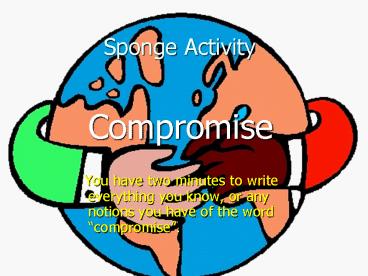Sponge Activity - PowerPoint PPT Presentation
1 / 13
Title:
Sponge Activity
Description:
Sponge Activity Compromise You have two minutes to write everything you know, or any notions you have of the word compromise . What is Compromise? – PowerPoint PPT presentation
Number of Views:73
Avg rating:3.0/5.0
Title: Sponge Activity
1
Sponge Activity
- Compromise
- You have two minutes to write everything you
know, or any notions you have of the word
compromise.
2
What is Compromise?
3
Definitions of Compromise
- 1) A beautiful way to solve the issues and
problems peacefully through straight forward
conversation. The Urban Dictionary. - 2) Settlement of differences by arbitration or by
consent reached by mutual concessions. Merriam
Webster Dictionary - 3) To compromise is to make a deal where someone
gives up part of, or all of its demand. Wikipedia
4
Peace, Order, and Good Government..
- Eh?
5
Canada has a Parliamentary Government.
6
Question Period
- http//www.youtube.com/watch?vqTvv_M6LL1sfeature
related
7
- Question Time Part II
- http//www.youtube.com/watch?vi5jUBLTqZoIfeature
related - What do you think?
- Is this anyway to run a country?
- Where is the peace, order OR good government?
8
Compare
- Lets recall how the United States does it.
- http//www.youtube.com/watch?vRkzetto7xGA
- Are we more civilized?
- Do we actually accomplish much with our
civility? - How do you disagree with a friend or family
member? - What works? How do you hash out your differences?
9
- Canadas
- System
- Of
- Government
- Westminister
- Style of Responsible Government
10
How does it work?
- The head of Canadas executive branch is the king
or queen of the United Kingdom, entrusted with
powers over the legislative and judicial
branches. Historically, this position is honorary
rather than enforced, though should they decide,
the monarch could assert considerable power over
Canada. As they are geographically quite far
apart, the monarch appoints a Canadian
governor-general to oversee the executive powers.
Although the executive branch typically bows to
the will of parliament and the constitution, it
does so by tradition rather than law. - The governor-general appoints the prime minister,
who is the head of the federal Canadian
government. The prime minister is almost always
chosen from whichever party holds a majority in
the house of commons, however if no party holds a
majority, they are usually appointed from the
party with the most members. Though the prime
minister cannot be removed from office, the House
of Commons can pass an act of no confidence in
the government, which will generally result in
the resignation of the prime minister and his
cabinet. - The legislative branch of the Canadian government
is bicameral, meaning it has two houses of
legislative power. The appointed house is called
the Senate, and members are selected by the
governor-general with the advice of the prime
minister. The elected section of legislative
government is called the House of Commons, and is
chosen by democratic election procedures every
five years. Though in theory both branches are
roughly equal in power, the House of Commons
generally wields the most power in the Canadian
Government and introduces considerably more bills
to Parliament. - Canadas federal judicial system oversees all
criminal law, as well as maintaining a Supreme
Court appointed by the governor-general. Civil
law is monitored using the principles of British
common law, except in Quebec, where a French code
is followed. The Supreme Court consists of nine
judges, and is used as a last resort court
system, when a case cannot be adequately
completed by lower courts. - The constitution of the Canadian government was
created in 1867 as an Act of the British
parliament. In 1982, the constitution was amended
to give Canada political independence from Great
Britain, although the monarch still retains
executive powers. Additionally, the 1982
amendment contained an outline of political
rights and freedoms for citizens, similar to the
ten-part Bill of Rights that begins the American
constitution.
11
Group Work
- Using prior knowledge from your reading last
night on Canada Northern Neighbor Government
pg. 41-51 and using How Canadians Govern
Themselves Parliamentary Government pg 3-6 as
reference tools design a graph outlining how
Canadas Parliamentary System works. - You will create your own diagram, and then move
into your pair share group to discuss.
12
Exit Ticket
- On an index card analyze how a Prime Minister is
selected to be the Canadian Head of Government. - Rubric
- 4 4 correct points
- 3 3 correct points
- 2 3 points, but not all correct
- 1 1 or 2 correct points
13
Homework
- Go online and find an example of Question Time or
a Canadian Parliamentary issue. Load it on your
thumb drives or email to me for presentation to
the class tomorrow!































